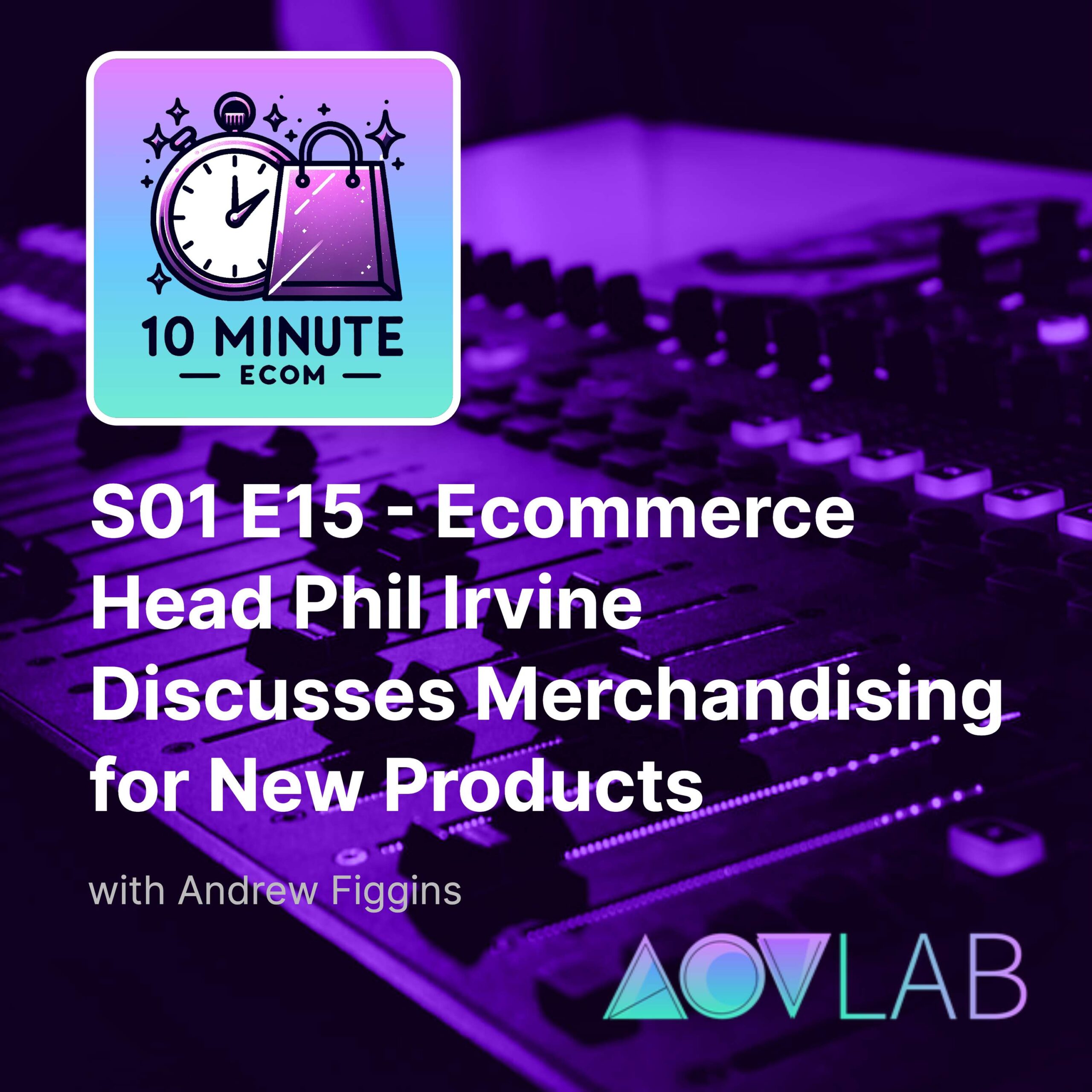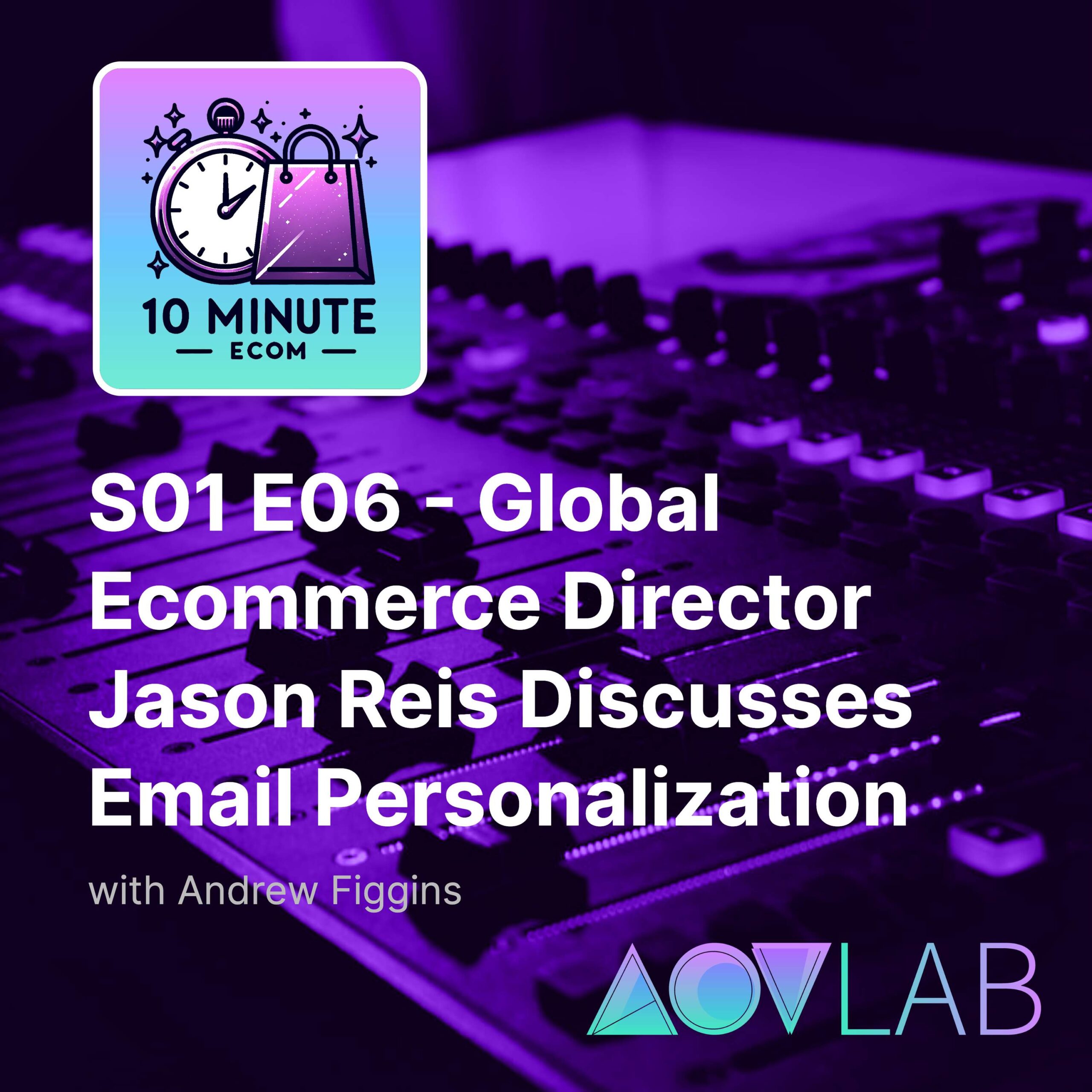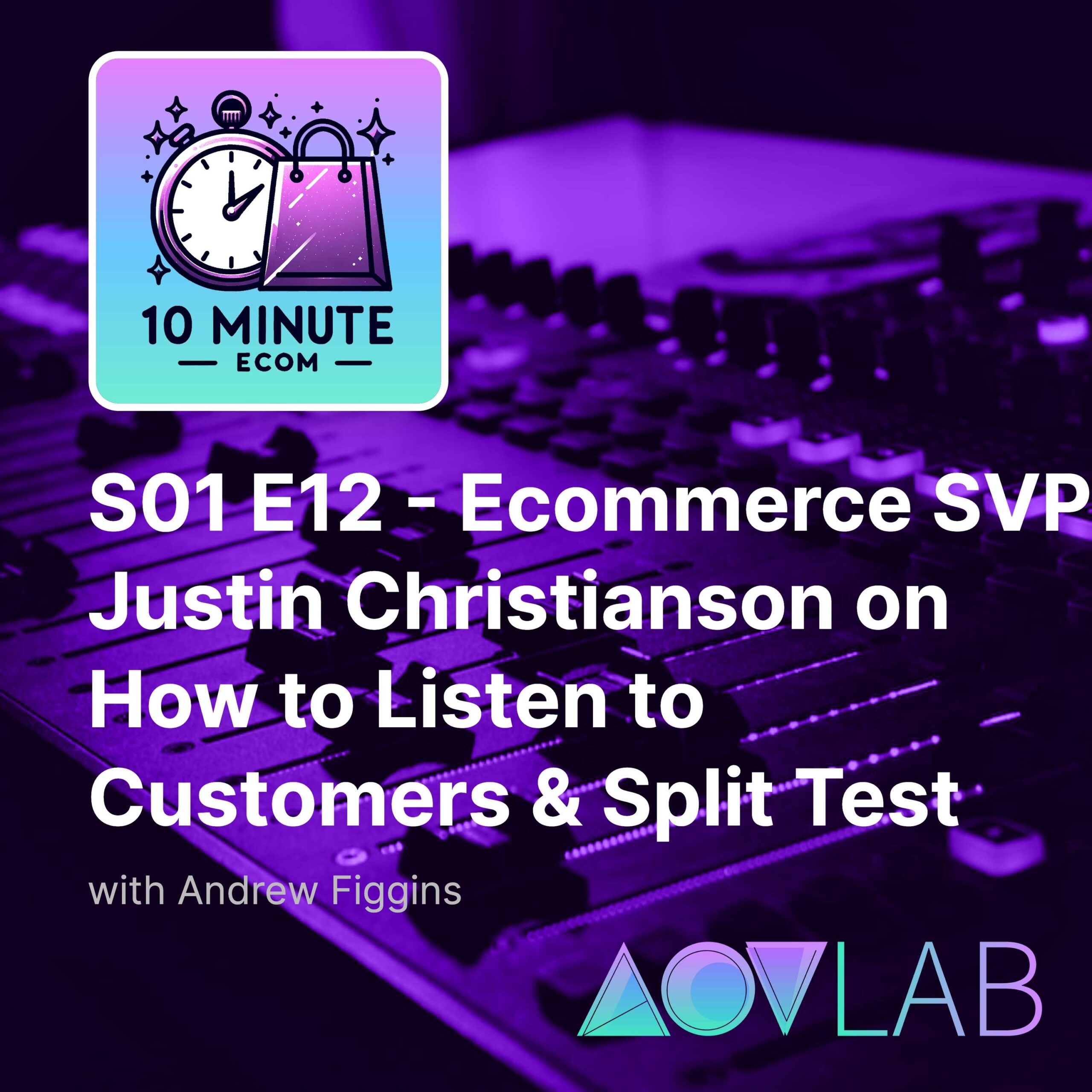Episode Transcript
[00:00:10] Speaker A: Hello, ecommerce fans, and welcome to ten minute Ecom, an AOV Lab podcast. Every episode, we break down a new and different tactic that can help you improve your ecommerce KPIs key performance indicators I'm your host, Andrew Figgins, and most of you, I am an e commerce professional. You may know me as the founder of AOV Lab, the former vp of product innovation at Scrubs and Beyond, the former director of ecommerce technology at Rural King, or just from LinkedIn. Today I'm happy to be talking to Catherine Neal, an e commerce colleague that has held a variety of interesting roles in ecommerce, including at Parch Spirits Co. And many others.
Catherine, what did you come on the show to share today with your e commerce colleagues?
[00:00:56] Speaker B: Hi, I'm Catherine Neal and I am from Parch spirits. We are a startup based in Charleston, South Carolina, but the company is a remote first. We're a totally asynchronous team. One thing that I've seen that works in Ecom, and this is not going to be some brilliant revelation. If you're here for that, I'm so sorry. That is not it today, but it's just going to be to give some forethought to your data collection, your metrics, what you're pulling in from customers. Have a conversation before you really get started, and map out a data strategy so that your data really works for you.
[00:01:35] Speaker A: Thank you, Catherine. After the ad, we'll get right into the chat.
Today's episode of ten minute Ecom is brought to you by thrive ecommerce. If you are struggling to get your onsite promotions seen and engaged with, ecommerce is a goto tool that can help. I am actually a repeat customer of thrive, most recently with Chefware.com, and I can't say enough about how impactful their tools are at driving increased conversion and revenue. If you'd like to set up a discovery call with Thrive, head over to aovliab.com and tap on Vendor network to set up your 30 minutes discovery call and to see what all the fuss is about.
And now back to the show.
[00:02:18] Speaker B: I see a lot of brands that I've worked with. A lot of people come in and they just have this big giant bowl full of data points, and that's great, but you're leaving money on the table if you don't implement that and pull it in for something that implements nicely into your overall strategy for your brand.
[00:02:41] Speaker C: Thanks so much for joining the show today. I'm excited to talk to you about this, and I know that you have some past experience in operational roles. And so I think it's interesting because when data is talked about, it's typically from like a technical perspective or a business perspective. And I just haven't heard a lot from the operations perspective, but I think that's super interesting. Tell me how as an operator, you help to organize the data and how you see it needing to be organized for the entire organization to be successful.
[00:03:14] Speaker B: That's definitely a good point. I will welcome a business analyst or someone to come in and really crunch numbers on any team that I am on. They are much, much more adept at that than I am. But I have a lot of clients come in over past brands and over the years of consulting, and they're just, like I said a moment ago, just leaving money on the table. From the ops standpoint, whether you're on the vendor side, on the three PL side, wherever you are within a brand world, or within this great crazy ecommerce space, we've got Black Friday bearing down on us. My mindset is just low grade panic right now. I hope you can't tell.
[00:03:55] Speaker C: It doesn't come off. It doesn't come off at all.
[00:03:58] Speaker B: But from the operations standpoint, I think it saves us a lot of work if you look at the data. Otherwise, you're a b testing. You're throwing things at the wall to see what sticks. A lot of times the answer is in front of you and it lives in your customer data or in your purchasing data or kind of whatever. It'll be different for. It'll be specific to brands. Are you selling something tangible? Are you in the CPG space? Are you selling a service? Are you on the SaaS side of things? It'll definitely be different. You have to tailor it to your specific brand and the business objectives that you've laid out. But yeah, it helps me save time if I just look for the answer in what we already have or what the brand already has. So often it's staring you right in the face. It can lead your brand strategy. If you're not really clear on, for example, and I won't get tangential with you, but I work primarily with startups. I am on the team of a startup right now, and what you see a lot of the time is that founders get really excited about sales happening, especially in the CPG space, when they've made something that you can hold in your hand, a drink, a food item, something like that, and they just want to sell it everywhere. They want to get it on shelf anywhere, everywhere. All of that we see a lot of lack of sales strategy, a lot of lack of focus, not really in the parch team, but just with startups in general, you can really maximize your money and that you're putting out and that's coming back to you. Hopefully maximize your revenue streams with just a little bit of focus and your early customer and sales data where you're getting inquiries. If you use a platform like Westock, which I think is great money, spent, early money to spend, is a platform like Westock that gives you data and gives you something to take to.
For example, if you're trying to get on shelf at a retailer, a key account, something that's important for you in a region that you want to target, all the things are coming up aces for this particular retailer. If you're going in blind, your sales team doesn't really have a leg to stand on. Hey, why do you want to be here? We just like you. We like the layout of your store. We think we met, they've heard that before. If you can come in with something concrete and say, hey, yeah, we love you, we love your layout, we love what you guys stand for, your value system, your mission driven, whatever it may be that speaks to you and your brand. If you come in with actual data points and you say, hey, we've actually had 200 independent inquiries for your store, specifically on this street, in this town, those are 200 sales that you're not getting because we're not here, that speaks volumes. You've got a lot of people in this world and in this little niche that we've carved out for ourselves in ecom that are very dry. They're smart. They don't care about the flowery language and the marketing. They care about the numbers. Will this sell or will it gather dust on my shelf? One of the two, they get very black and white with it, which I think there's a lot more room personally, but I understand the perspective of, is this going to sell or not? If you come at them with something concrete, that's really hard to look away from. Or it would be for me if I was on the retailer side.
[00:07:26] Speaker C: Absolutely. Yeah. Having that hard data, being able to share it with them in that way hopefully puts them in that no brainer territory, even though I know sometimes it's a lot harder than that. Of course, tell me. And not just, I didn't mean to pigeonhole you into operations, but no, not at all.
[00:07:45] Speaker B: That's where I live. I'm the boring side, I'm the number side and vendor board and all of that.
I work with primarily really high functioning creatives. I hope they don't get offended by me tying those two phrases together.
I think my boring, dry, analytical way of doing things and way of prioritizing data, prioritizing metrics, pairs really nicely with those hyper creative founders that are just excited and they're brilliant and they just come in so hot with whatever they're excited about, whatever they've created, whatever they're bringing to the table, that it tends to get a little unfocused because of that excitement level. So you need someone very boring like myself, to balance that out.
[00:08:34] Speaker C: Gotcha. Yep. And that makes a lot of sense to me as well. I wanted to ask you, how do you find those insights? If you have that bowl of data that you mentioned at the beginning and the founder brings it to you, they're excited about it, but really they haven't found the insight yet. How do you start to pick through that? Or how do you start to organize that, to start to extract out some of those insights that really can help.
[00:09:01] Speaker B: If you skip the conversation part and the personal part, which I feel like people are doing that more and more. They're just going straight to the they see a spreadsheet and they just get excited and go hole up in their office and dive into it. And I certainly have that as well, occasionally, that motivation to just get my coffee and just dive right in. I think that's the most important part, is to have a conversation with your example, a founder, bringing you that bowl of data. Have a conversation with them. What are you about? What is your brand about? What are you bringing to your customers? What problem are you solving? What does success look like to you? That's a personal and professional question that I find myself returning to a lot, because you and I may start brands side by side and we define so much differently. So you're really happy with your progress, and I'm really sad with mine. Even though they're perfectly aligned, my success for me may be landing a large regional retailer in the first 18 months from jump. Whereas to you, 100 regional doors in your town and surrounding towns are what looks like success to you.
It really is individual, it is integrated into. Founders tend to integrate themselves heavily in their brands, especially with startups. And so I want to know those things. Like, I can look at a spreadsheet. Anybody, not me. People that do that crunch numbers way better than I do, and they know their excel shortcuts very quickly. Our current CEO is a total whiz. I'm amazed. I'm totally in amazement whenever we hop on a shared spreadsheet rodeo. Paul Donna, he's incredible. He does much more than numbers, but he is an absolute whiz at building spreadsheets and getting that data to do work for us. I think something is having that conversation early on, whether you're having it internally with your brand or you're bringing in a consultant, maybe you're talking to your first outside sales team. I think knowing your business objectives, understanding what you want to do, what success looks like for you, and then going from there and mapping out, knowing the difference between a metric, a data point, versus a KPI. There's so many of these acronyms in our business, right? KPIs, okRs. We can really go. You and I can spiral down the rabbit hole with that.
We'll do that offline, Andrew.
But how do you want to scale? What do you want your company to look like if you want to get micro with it? What does a single customer purchase look like? Is it an aov of $20 is successful to you? Is it 40? Is it 100? Is it a million? What is it? Knowing those answers will help a lot. And the earlier you have those conversations within your team, the better off you are. What is it? I believe it's Peter Drucker. That said, you can't manage what you can't measure like you want to implement those strategies as early as you can, because otherwise you do just have a pot of data and you just get mired down in it because there's no way to suss out patterns, there's no way to pull out important pieces, important bits that will really help you down the line. Weaving strategy into data collection is integral, I think.
[00:12:27] Speaker C: Excellent. Catherine, thanks so much for bringing that tactic today. I think it's certainly unique in what we've heard about so far in the show. And yeah, I'm excited to learn more about this as well. Just diving into some of the show notes. I'd love to add some resources as well for some folks that are either they need to, like me, go back to basics and really understand how to put together a data plan. I'm not even sure that I've done that for my own startup quite yet, so I feel a little guilty, but in a good way, because I know that what you're saying is right, because you've seen it work for. So thanks so much for coming on. Is there anything that you'd like to share with your colleagues in ecommerce out there? Before heading off today?
[00:13:09] Speaker B: I'll really niche down into the space that I take up right now, which is in the nonalcoholic beverage world.
Obviously, it's a category that's absolutely exploding. Really exciting to be working in it while it blows up in a positive way. The popularity is really incredible, and it's such a new category and in a period of high growth that it hasn't gotten to be cutthroat yet. There's not a lot of gatekeeping. It is really a little community. I have founders reach out. I know Parch's founders are in cahoots. They're taking calls with other founders in the non out space. I haven't experienced that before.
[00:13:52] Speaker C: I love that.
[00:13:53] Speaker B: It's really taught me to change how I function as a professional. I think the pendulum needs to swing back the other way from gatekeeping strategies, which is so perfect that you're starting this podcast. I think that's incredible to just share our resources, share our information. I'll give startup CPG a shout out. They're incredible. I have not seen anything like what they're doing in this space yet. They're really amazing. If you haven't checked out startup CPG, definitely do that. LinkedIn is a great resource. I've had people reach out to me completely, like a complete cold call and just say, hey, I saw you comment on this, or I heard you on this podcast episode or whatnot. You said something that I need to understand, and I don't. Can we hop on? Yeah, absolutely. Let's hop on. A call or we've had founders reach out, and I've definitely done this to other brands in the CPG space over the years. Hey, you're on shelf at this particular place, and they've stonewalled me. How did you do that? Are you selling well there? What do you like? It can go from macro to really micro, and that is, I'll speak directly to the Na space. Like, I am so grateful for that. As we head into our holiday season, supposed to be focusing on what we're grateful for. I could not be more grateful for that. It's really beautiful. I hope we can hang on to it. I hope it doesn't change as acquisitions inevitably start to happen in this space. I hope that we can hang on to this. So I'm really loving it so far.
[00:15:20] Speaker C: That's awesome. Thanks again, Catherine, for coming on the show today.
[00:15:24] Speaker B: Awesome. Thanks so much, Andrew. Bye bye.
[00:15:28] Speaker A: Well, we have hit that ten minute mark, so that's a wrap for today's episode. I want to again thank our guest, Catherine Neal. If you have a moment.
[00:15:36] Speaker C: There's a couple of ways you can.
[00:15:37] Speaker A: Be super helpful to the show.
Number one, be sure to subscribe, like, or follow the show on Apple Podcasts, Spotify, Amazon Music, Google Podcasts, or wherever it is that you listen.
Number two, if you're an e commerce professional that would like to join for an upcoming episode, reach out to humans at aov lab.com or to Andrew Figgins myself on LinkedIn and let me know.
I hope you're enjoying season one of the podcast. There will be 27 episodes total, and today's is number seven. Also, a reminder that once we hit the new year, three new episodes will be published each week. Until next time, this is Andrew Figgins signing off and saying have a good one.


